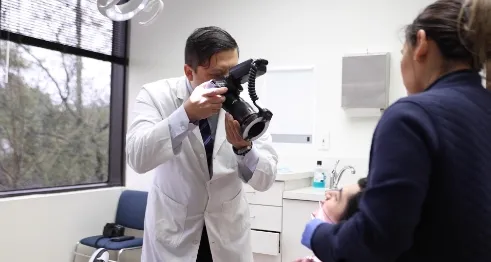Dental Implants Houston
State-of-the-Art Solutions for Tooth Loss
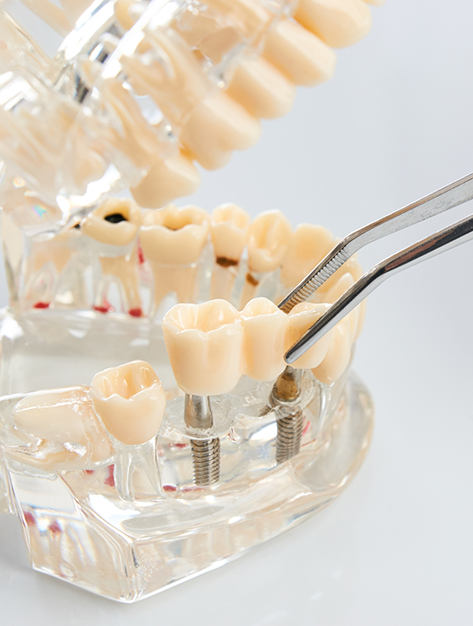
When it comes to replacing your missing teeth, dental implants are the next best thing to a natural tooth. They’re the only kind of restoration that completely restores the entire structure of a missing tooth – including the roots that anchor it into your jaw. With the expert oversight from oral surgeons at Piney Points Oral & Maxillofacial Surgery of Houston, you’ll soon once again have a strong, natural looking smile to show off to the world. Call today to schedule your initial consultation to discuss tooth replacement with dental implants in Houston!
Why Choose Piney Point Oral & Maxillofacial Surgery of Houston for Dental Implants?
- Safe Sedation & Anesthesia for Maximum Comfort
- Team of Experts with Years of Experience in Implant Dentistry
- Advanced Technology for the Best Possible Results
What Are Dental Implants?
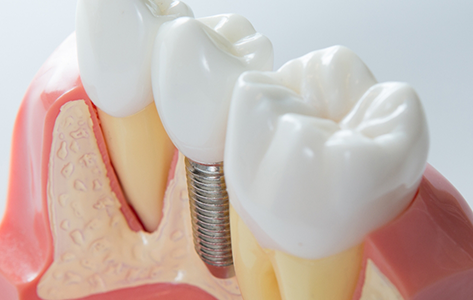
Dental implants are basically substitutes for missing tooth roots. They look like a small screw-shaped posts that can be inserted into the jawbone. Once there, they fuse with the bone to form a solid foundation for restorations. This allows them to perform the same functions as natural teeth, even the stimulation of bone growth in the jaw. On the other hand, traditional tooth replacement options like dentures and dental bridges only restore the crowns of missing teeth, which leaves them far less stable, long-lasting, and functional than dental implants or real teeth.
Dental implants consist of three important parts – the biocompatible titanium post that fuses with the bone, the natural-looking replacement tooth that shows above the gumline, and the abutment that holds the two together. If you look at the smile of someone who has an implant restoration, whether that be a crown, bridge, or denture, you probably wouldn’t be able to tell it apart from a natural tooth. The implant itself is completely hidden under the gums while the restorations will be carefully crafted to fit in seamlessly with the rest of your smile.
The 4-Step Dental Implant Process
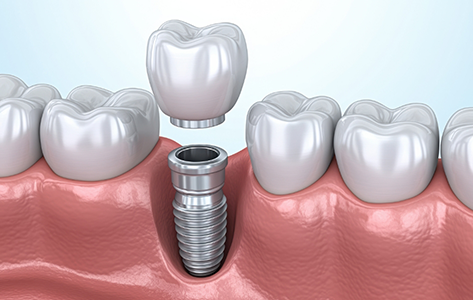
Many dental implant patients are referred to oral surgeons, who are happy to partner with local dentists to ensure smooth treatment. In these cases, they work with your regular dentist to create a custom treatment plan for you. You’ll visit them to have your dental implants placed, then return to your dentist’s office to have the restorations attached to them. However, if you do not have a dentist whom you regularly visit, your oral surgeon in Houston can perform your entire treatment in their office, from consultation to placement of your final restorations.
Initial Dental Implant Consultation
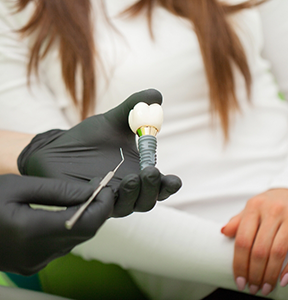
Your oral surgeon will strive to learn about you and your oral health. They will use a CT scanner and other advanced technology to examine your mouth. In some cases, they might determine that you need preliminary treatments, such as a bone graft or tooth extractions, before you receive dental implants. They will let you know exactly what is likely to happen throughout your tooth replacement journey, from your implant placement surgery to your final restoration. They will also discuss pricing. Feel free to ask any questions you may have — your oral surgeons want you to commit to your treatment with confidence!
Dental Implant Surgery

Our oral surgeons at Piney Point Oral & Maxillofacial Surgery of Houston take pride in their ability to place dental implants in the best way possible. Using guided surgical techniques (as opposed to freehand), the ideal place, depth, and angle for each implant can be determined.
The procedure starts when your oral surgeon administers anesthesia and/or sedation. They will create incisions in the gums, place the implants, and close the incisions. (Some patients receive an immediate restoration during their surgical appointment, particularly when receiving All-on-4 or Teeth in an Hour.) The surgery is fairly quick, and most patients are able to return to work within one or two days.
Dental Implant Osseointegration & Abutment Placement
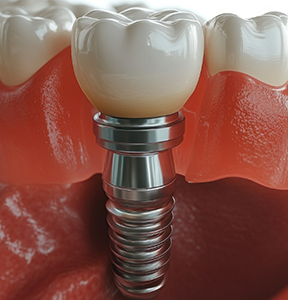
Osseointegration is the remarkable biological process through which dental implants bond with the bone around them. It is what enables them to provide the strongest base possible for your new teeth. Osseointegration typically takes at least several months. Following it, you might need to undergo another surgery. Your oral surgeon will expose the implants and place healing caps on them. Later, after your gums have recovered, you will receive abutments (small connector pieces that will keep your restorations in place). Some patients do not have to have this second surgery because they receive abutments during their initial implant placement procedure.
Delivery of Dental Implant Restorations
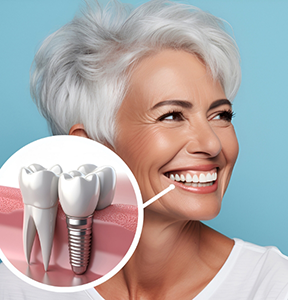
To design your restorations, your implant dentist in Houston (whether that is your oral surgeon or general dentist) will take detailed impressions of your mouth and plan out the details of your new teeth. Their size, shape, and color will all be chosen with your unique oral anatomy and facial characteristics in mind. After a laboratory crafts your restoration, it will be attached to your dental implants, and you’ll receive some tips on how to get used to using it. Then, you can go and begin to enjoy all the remarkable benefits of your renewed smile.
Benefits of Dental Implants

More than five million dental implants are placed by dentists in the U.S. each year – and when you understand the many benefits offered by this treatment, it is easy to see why it is so popular. Dental implants have the potential to improve your everyday quality of life, support your oral and overall health, and provide you with decades of strong, reliable smiles. Continue reading below to learn more about how this type of tooth replacement might be able to benefit you.
Day-to-Day Benefits

The day-to-day benefits of dental implants in Houston include:
- Lifelike tooth replacement. Implant restorations are carefully designed to look as natural as possible. In fact, most people can’t tell the difference between a real tooth and a dental implant. Furthermore, implants feel so comfortable that even you may forget they’re there!
- Easy maintenance. In many ways, caring for dental implants is just like caring for natural teeth.
- Remarkable chewing power. Dental implants offer a strong bite force. In fact, they are able to handle virtually any food, including raw vegetables, tough meats, and all of your favorite movie-time snacks.
- Clear speech. Unlike traditional dentures, dental implants don’t slip around in the mouth and will not interfere with your pronunciation. After you get used to using them, you should be able to speak with confidence in every situation.
Health Benefits

Dental implants can support oral and overall health in numerous ways:
- Prevention of bone loss. Implants make it possible to stop the bone resorption that occurs after tooth loss, keeping the jaw strong and healthy. This allows your face to maintain its natural, youthful shape.
- Protection for natural teeth. Dental implants can prevent your remaining natural teeth from drifting out of place. Plus, unlike a traditional bridge, they don’t usually require any nearby teeth to be modified.
- A balanced diet. By enabling you to eat a wide variety of foods, dental implants can help you enjoy the disease-preventing benefits of good nutrition.
- No gum sores. Because they don’t rely on the gums for support, dental implants are unlikely to cause sores or sensitivity in the gum tissue.
Long-Term Benefits

You can start to enjoy the benefits of dental implants as soon as you receive restorations from your implant dentist in Houston, and you can continue to enjoy them for decades. Their long-term benefits include:
- Many years of function. For more than 90% of patients, their implants are still thriving 10 years after placement. With proper care, your implants could even last you an entire lifetime!
- Save money. Although dental implants present a significant upfront cost, their longevity may make them cheaper in the long run than tooth replacement solutions that wear out after just a few years.
-
Save time. You won’t have to visit your dentist for denture relines or other significant maintenance. As long as no unexpected problems arise, dental implants require routine professional maintenance a couple times each year.
Who Dental Implants Can Help

Dental implants can help almost any healthy adult to overcome tooth loss, whether you are missing one tooth, several teeth, or all of your teeth. During your personalized consultation, your surgical team will thoroughly evaluate your oral health to determine whether you require any preliminary procedures and what type of implant treatment may be best for you. Then, they will get to work on planning and building your new smile.
Who Is a Good Candidate for Dental Implants?

To be eligible for dental implant treatment, you should:
- Have a fully grown jaw that contains enough bone tissue to secure the implants in place.
- Have a healthy mouth that is free of gum disease and other serious problems.
- Be willing to commit several months to completing the implant process.
- Have fair overall health.
Even if you have suffered from bone loss in your jaw or have an oral health issue, implant placement may be possible after the necessary preparatory procedures have been performed by a qualified dental implant dentist in Houston. They will then design your treatment around how many teeth you are missing.
Missing One Tooth
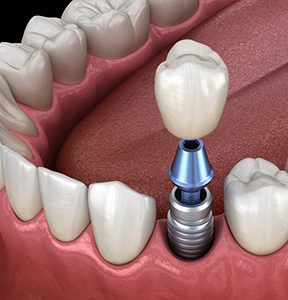
While a bridge can often benefit patients who have lost a single tooth or a few teeth in a row, they require altering perfectly healthy teeth near the affected area in order to be placed. Bridges also usually need to be replaced multiple times over a person’s lifetime, requiring additional time and effort.
Dental implants, on the other hand, are a conservative treatment in that they preserve the maximum amount of tooth structure. A lone dental implant can be used to fill an empty space in your mouth no matter where it is located. Once the implant fully integrates with your jawbone, you will receive a beautiful crown to go on top of it.
Missing Multiple Teeth
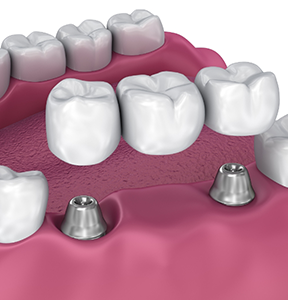
Of course, tooth loss isn’t always as simple as one individual tooth falling out at a time. In some cases, patients have a much larger gap to contend with. Dental bridges are often used to replace multiple teeth at once, but when they’re attached to dental implants, you’ll enjoy all of their benefits without having to make permanent alterations to your natural teeth. It takes two dental implants to support a bridge that replaces at least three consecutive teeth. If you are missing only two teeth in a row, you may require just one dental implant.
Missing All Teeth
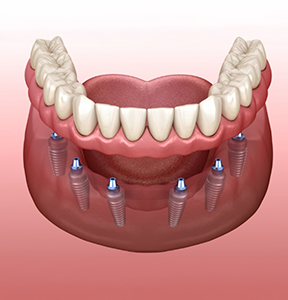
Are you tired of your dentures moving when they’re not supposed to? With just four to six dental implants, an entire row of teeth can be anchored within your mouth — no need to rely on natural suction or to apply denture adhesive. Your new smile will look and feel more natural this way, and it will help you recover most of your bite strength, allowing you to once again enjoy a wide variety of foods.
The team at Piney Point Oral & Maxillofacial Surgery of Houston offers multiple types of implant dentures, including removable ones, traditional fixed prostheses, and the innovative and streamlined All-on-4 treatment.
Learn More About Implant Dentures
Learn More About All-on-4 Dental Implants
Learn More About Teeth-in-an-Hour
Dental Implant Post-Op Instructions

Following your dental implant surgery, you will face a recovery period. For most patients, this process goes smoothly as long as they carefully follow their dental implant post-op instructions. Below, you will find practical guidance to minimize your discomfort, reduce your risk of complications, and make your recovery as easy as possible.
What to Do Directly After Dental Implant Surgery

Blood clots should form at your surgical sites. These are a key part of your body’s healing process, so they should remain undisturbed. To reduce the risk that they will be prematurely dislodged, you should:
- Avoid drinking from a straw.
- Abstain from smoking for at least two weeks (longer would be better).
- Avoid spitting. Instead, swallow excess saliva or use tissues to absorb it.
- Resist any temptation to touch your surgical sites with your tongue or fingers.
Common Side Effects

Patients commonly experience the following during the first few days after they receive dental implants:
- Intermittent bleeding. Gauze, applied with light pressure, can keep this under control.
- Swelling. This may continue for a few days to more than a week. Cold compresses can help to minimize it.
- Discomfort. Taking pain medications, as well as getting plenty of rest, can help to take the edge off of any discomfort. Most patients are able to return to work the next day.
If you experience any severe or unusual side effects during your recovery, call your implant dentist right away.
Diet

At first, you should consume a no-chew diet, which may include foods like yogurt, smoothies, applesauce, and brothy soups. After several days, you may progress to fork-tender foods, such as scrambled eggs, soft bread, meatloaf, and other items that are easy to cut with the side of a fork. When your soft oral tissues are fairly well recovered, you can try adding harder foods back into your diet. You should abstain from alcohol for as long as you are taking pain medications (or for as long as your oral surgeon recommends).
Health & Oral Hygiene

The day after your surgery, you can brush your teeth. However, you should be extra careful around your surgical sites. Rinsing with salt water two or three times each day can minimize inflammation and promote healing. If you have a prescription mouthwash, be sure to use it as directed. However, any mouthwashes with a high alcohol content should be avoided.
What to Do After Your New Teeth Are Attached

Once your new teeth are attached to your dental implants, you should not experience any bleeding, significant swelling, or downtime. Your gums may be a little tender, but you can expect that to wear off pretty quickly. You may want to eat soft foods for a while, but after you adapt to your prosthetic, you can enjoy a robust diet.
Maintaining & Caring for Your Dental Implants

After your dental implants are firmly in place and have their restorations attached to them, you can look forward to enjoying their benefits for many years. In fact, your implants may even be with you for a lifetime. However, they can only live up to that potential if they receive proper maintenance. Here are some practical tips for dental implant care:
Make Oral Hygiene a Priority

Dental implants cannot develop cavities, but if the tissue around them gets infected, the implants could fail. Fortunately, thorough oral hygiene can greatly reduce the risk that such an infection will occur. You should:
- Brush your teeth twice a day.
- Floss daily.
- Use an antibacterial mouth rinse.
- Follow any hygiene instructions that are specific to your restoration. For example, you may need to remove an overdenture for daily cleaning.
Eat a Healthy Diet

Dental implants can handle virtually any food, so you should feel free to enjoy all of your favorite meals, snacks, and treats. However, keep in mind that some foods are tougher on dental implants than others. You should avoid overindulging in sugary, sticky, and hard items. Instead, try to center your diet around foods that support oral health, such as those that are rich in calcium, vitamin C, and vitamin D.
Break Bad Habits

Some bad habits that can adversely affect dental implants include:
- Smoking/Using Tobacco Products. This is one of the biggest risk factors for dental implant failure.
- Chewing on hard objects. Biting down on ice, chewing on pen caps, or eating extremely hard candy could break your implants’ restorations.
Any effort you put forth to break such bad habits will be worth it! If you are struggling with tobacco addiction, ask your primary care practitioner for assistance. They may be able to offer practical guidance and resources.
Protect Your Dental Implants
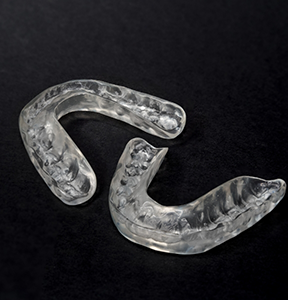
If you play sports, you should always wear a mouthguard to protect both your dental implants and any remaining natural teeth. Custom mouthguards from dentist are more effective than store-bought ones.
If you grind your teeth while you sleep, you may need a different type of mouthguard. It can place a barrier between your upper and lower teeth at night in order to prevent premature wear and tear on your implants and oral tissues.
Schedule Regular Dental Checkups

You should continue to visit your general dentist twice a year for a cleaning and checkup. They will monitor the health of your dental implants, remove your restorations in order to clean around your abutments, and give you practical advice on dental implant care. If you ever run into any unusual symptoms with your prosthetic tooth roots, call Piney Point Oral & Maxillofacial Surgery of Houston.
Understanding the Cost of Dental Implants
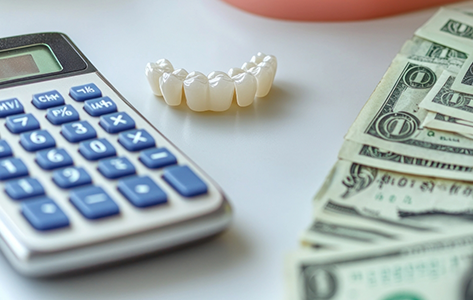
Each stage of the dental implant process comes with its own cost, and the total price depends on how many teeth you need to have replaced as well as other unique circumstances. Your oral surgeon can give you a rough estimate of the final cost during your first consultation. Compared to other tooth replacements that have to be done roughly every 10 years, dental implants last for a much longer time, allowing you to save money over the years. Most patients even qualify for no-interest or low-interest financing.
Preliminary Treatments & Dental Implant Surgery
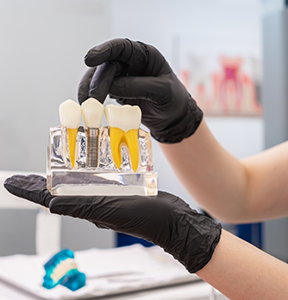
Some patients require preliminary treatments, such as gum disease treatment, tooth extractions, or a bone graft, before they can receive dental implants. Each of these services comes with its own price.
The implant surgery itself incurs a separate fee. As oral surgery experts, the team at Piney Point Oral & Maxillofacial Surgery of Houston can perform this complex procedure in-office. You can expect transparent pricing and you won’t have to worry about dealing with the financial policies of an outside specialist.
The Parts of Your Dental Implant
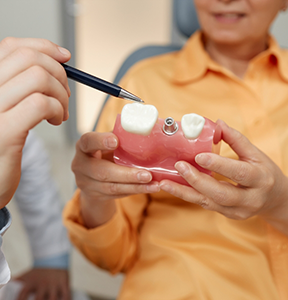
Not all dental implant treatments are the same. Different patients require varying numbers of implants, and implants can come from a wide range of manufacturers. They also come in different sizes and materials. Different surgical techniques may involve the use of specialized materials or customized provisional prosthetics (as is the case with All-on-4). All of these factors have a bearing on the cost of dental implants in Houston.
How Dental Implants Can Save You Money
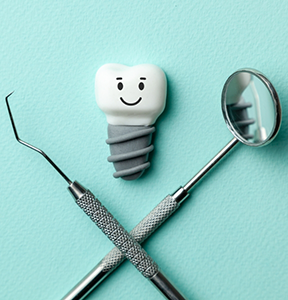
Although dental implants cost more upfront than traditional forms of tooth replacement, they are a smart long-term investment. Other prosthetics, such as traditional dentures, may last for just five to seven years before they are no longer functional. They also leave you vulnerable to a range of oral health problems. Dental implants have the potential to last a lifetime, and their restorations can also endure for many years. They can even help you save money by protecting your health.
Does My Dental Insurance Cover Dental Implants?

Some dental insurance plans cover implants, while others do not. Your oral surgeon’s team will be happy to help you understand the details of your coverage. Even if it does not apply to the implants themselves, it may cover a portion of the price of your final restoration or preliminary treatments. As a specialty oral surgery practice, Piney Point Oral & Maxillofacial Surgery of Houston is happy to work with medical insurance, which occasionally covers dental implant surgery.
Making Dental Implants Affordable

Piney Point Oral & Maxillofacial Surgery of Houston is partnered with third-party lenders that offer low-interest and no-interest payment arrangements. Most patients qualify for credit, and you might even be able to choose from a range of plans so you can settle on one that works with your monthly budget.
Would you like to learn more about dental implants, their cost, and your payment options? Get in touch with the team today.
Dental Implant Technology
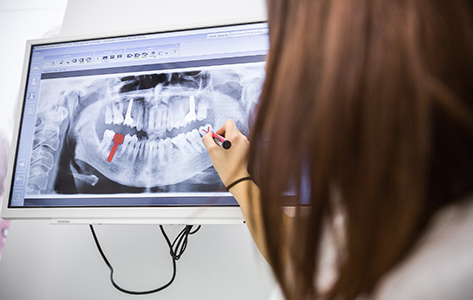
Your highly skilled oral surgeon uses their training and knowledge to perform predictable, successful dental implant procedures. However, they could not do what they do without the aid of advanced dental implant technology in Houston. Below, you will learn about some of the remarkable tools that they use to enhance your experience and contribute to the best possible treatment outcomes.
CBCT Imaging
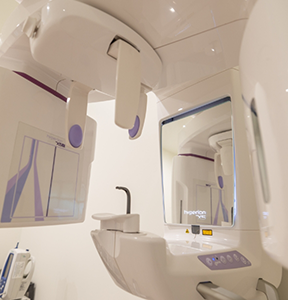
A CBCT machine is a more detailed, precise, and clear X-Ray. It uses a cone-shaped beam of radiation to create highly detailed, three-dimensional images of the areas it scans. Not only can it show your oral surgeon your jawbone and teeth, but it can also alert them to the positions of nerves and connective tissues.
Used as part of the dental implant planning process, a CBCT machine minimizes human error because it helps your surgeon anticipate what they will encounter during your implant placement surgery. Following your surgery, it can allow them to monitor osseointegration (how well the implants are bonding with the bone).
The scanning process is fast, painless, and noninvasive. All you have to do is hold still while the machine slowly revolves around your head. After the scan, your surgeon’s team will have immediate access to images of your oral structures. CBCT scans are also safe for the vast majority of patients. Although the machine uses more radiation than a normal X-Ray, it uses much less than a regular CT machine that you would find at a hospital.
Guided Dental Implant Surgery
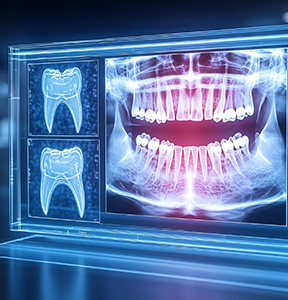
Many implant dentists and specialists use freehand techniques to place dental implants. Essentially, they take a highly educated guess as to where, how deep, and at what angle dental implants should be inserted into the jaw. In most cases, especially simple ones, freehand placement is successful.
However, guided dental implant surgery is more accurate and reduces the risk of human error. Prior to your surgery, your oral surgeon will use detailed scans of your mouth to design a surgical guide. After a laboratory creates the guide, they will use it during your procedure to ensure that they place the implants precisely where they belong.
Guided implant surgery is especially recommended for patients who are receiving multiple implants as well as those who have other complicating factors in their case. Although creating the guide may add to your overall treatment timeline, the peace of mind that it provides is well worth it.
Antibacterial Coating
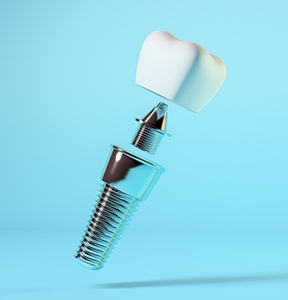
Dental implants are consistently successful, but there is always a small chance that an infection could compromise their function. Fortunately, your oral surgeon reduces that risk by using dental implants that have an antibacterial coating, which fights harmful micro-organisms that could otherwise cause a problem. Research even indicates that antibacterial coatings on implants can promote improved osseointegration. (Osseointegration is the biological process through which dental implants bond with the surrounding bone.)
E4D Digital Impression System
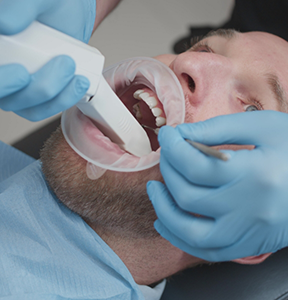
Often, oral surgeons partner with local dentists who design and create the restorations that get attached to dental implants. However, in some cases, they design the restorations themselves. To ensure that your prosthetic teeth fit as comfortably as possible, your oral surgeon must take impressions of your mouth.
Whereas many practices still use manual, putty-based impressions, Piney Point Oral & Maxillofacial of Houston has upgraded to digital impressions. By simply moving a wand-like device around your mouth, advanced software assembles the captured data into a digital, three-dimensional representation of your mouth.
Zygomatic Dental Implants
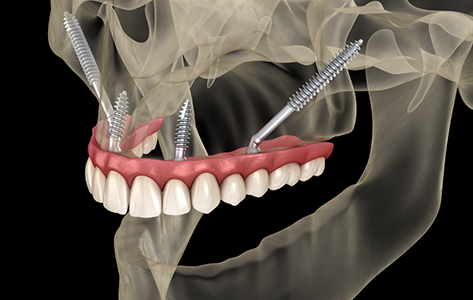
Zygomatic dental implants are closely related to regular dental implants, with the exception that, instead of being anchored into the maxilla, they are surgically placed in the zygomatic bone (the paired bones just above the maxilla, or the cheek bones). These are typically recommended for patients who don’t have enough jawbone density in their maxilla to support the successful placement of traditional dental implants.
Pterygoid Dental Implants
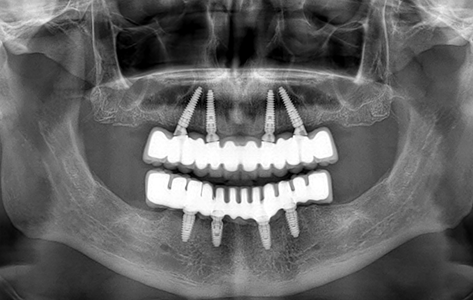
Much like zygomatic dental implants, pterygoid dental implants substitute the placement of traditional dental implants in patients who don’t have a dense enough maxilla for those secured in the pterygoid plate. This is a paired bone that’s located just beneath the jaw joints and forms part of the palate of the mouth. These dental implants are specially designed for patients looking for long-lasting solutions to tooth loss, allowing those who may not have enough height or width in their maxilla to effectively secure implants.
Advanced Dental Implant Procedures
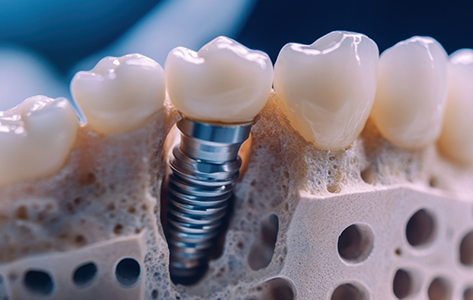
Not everyone can receive dental implants immediately following their initial consultation – but even if that is the case for you, you may become a candidate after some preparatory treatments. The team at Piney Point Oral & Maxillofacial Surgery of Houston provides advanced treatments that can prepare your mouth to receive implants and make your entire procedure as comfortable and efficient as possible. These procedures include bone grafting, sinus lifts, and PRP/PRF.
Bone Grafting
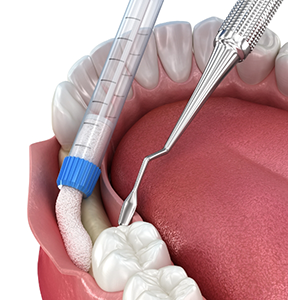
The alveolar ridge is the portion of your jawbone that supports your teeth. Tooth roots stimulate the ridge, helping to keep it strong and whole. Once a tooth goes missing, that stimulation is gone, and the bone begins to be resorbed (the body recycles its raw materials). Eventually, the alveolar ridge may become so thin that it is not able to support dental implants. Even some patients who have recently had their teeth extracted may find that their jawbone is not strong enough to accommodate their new smile.
In such cases, a bone graft using synthetic bone, or natural bone from another part of your body, can be placed next to the thin bone and allowed to heal for four to nine months. After the graft has fused or become integrated with your pre-existing bone, the alveolar ridge will be re-contoured, and the dental implant will be placed. In some instances, patients are even able to receive a dental implant on the same day as their bone graft.
Sinus Lifts
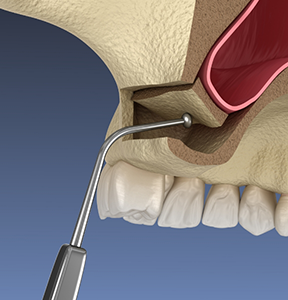
Your sinus cavities are located just above your upper molars. If the bone in your upper jaw is relatively thin, or you have naturally large sinuses, this poses a problem for dental implants. The implants might puncture the sinus membrane and lead to complications. Fortunately, there is a special type of bone graft that is designed to prevent this issue. A "sinus grafting procedure," which is also known as a sinus lift, can fortify your upper jaw and prepare your mouth for dental implants.
Usually, this treatment is performed at Piney Point Oral & Maxillofacial Surgery of Houston’s office with local and intravenous anesthesia. During your appointment, the membrane that lines the sinus will be located and elevated. Bone will then be added to restore height to the jaw and ensure that dental implants of an adequate length can be placed. This procedure can often be carried out at the time of dental implant placement, but in some cases, patients must go through a healing period of a few months before it is possible to place implants.
PRP/PRF
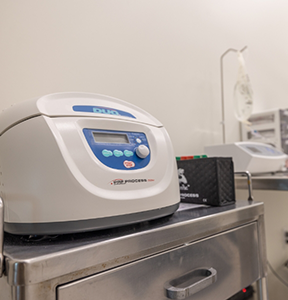
Platelet-rich fibrin (PRF) and platelet-rich plasma (PRP) are products that are created from a patient’s own blood. The blood is placed into a centrifuge, which separates its components. Then, the platelet-rich part of the blood is used to encourage healing after your dental implant placement surgery. This advanced dental implant procedure could speed up your recovery time, lower the risk of postoperative infections, and even reduce your need for pain medication.
Dental Implant Salvage
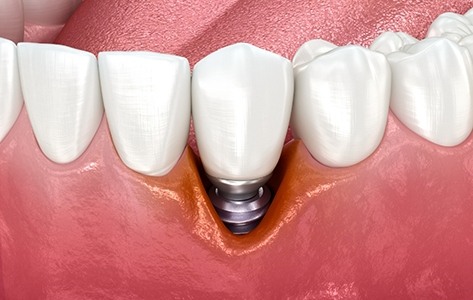
Dental implants have an impressive success rate of 95% -- but of course, the flipside of that is that failure is still possible. The most common cause of dental implant failure is peri-implantitis, a form of gum disease that occurs around the implant posts. No matter what the source of the problem is, your team of oral surgeons offer several solutions so that the implants can be salvaged or replaced. Get in touch with the team at Piney Point Oral & Maxillofacial Surgery of Houston right away if you notice any signs that something is amiss with your dental implants.
Learn More About Dental Implant Salvage
Dental Implant FAQs
What Can Cause Dental Implants to Fail?
Dental implant failure is quite rare. When it does happen, it is usually due to peri-implantitis, an infection in the tissue around an implant. It can cause so much damage to the gums and bone that they are no longer able to support the implant.
Another possible reason for implant failure is failed osseointegration. In other words, the implant does not bond properly with the jawbone. This may occur due to underlying health conditions or other factors.
You can minimize your risk of dental implant failure by avoiding tobacco use, maintaining excellent oral hygiene, and regularly visiting a dentist for preventive care.
How Long Does It Take to Recover from Dental Implant Surgery?
Most patients are able to resume work and other normal activities within a day or two of their surgery. However, you should continue to avoid strenuous physical exertion for at least a week, because it could delay healing. Within a few days, bleeding should subside, and within weeks, the soft tissue at your surgical sites should be fairly well-recovered. However, the bone will heal much more slowly; it may take four to six months to form a strong bond with your implants.
Can I Get Dental Implants If I Smoke?
Oral surgeons determine candidacy for dental implants on a case-by-case basis. Smoking will not automatically disqualify you from the procedure. However, it is a major cause for concern because it could slow down your body’s healing process, increase your risk of infection, and heighten your chances of experiencing dental implant failure. The team at Piney Point Oral & Maxillofacial Surgery of Houston highly recommends that you make efforts to kick the habit before your implant surgery. However, if you do not quit entirely, you should at least stop for the two weeks before and two to three months after your implant placement procedure.
Will People Be Able to Tell That I Have Dental Implants?
The team at Piney Point Oral & Maxillofacial Surgery of Houston carefully places dental implants so they are well-concealed beneath the gumline to ensure that their dark color is never visible through the gums.
The restorations on top of implants are designed with the purpose of making them look as natural as possible. Whether your restorations are provided by your general dentist, a prosthodontist, or your oral surgeon, you can rest assured that all the small details will be given appropriate attention during the design process. Once your new teeth are in place, onlookers may have no idea that they are not the same pearly whites you have had since you were a teenager!
How Long Do Dental Implants Last?
Dental implants are designed to last a lifetime. Once they integrate with the surrounding jawbone, their bond with your body should be permanent. However, whether or not they live up to their longevity potential depends on how they are cared for. You should diligently stick to a thorough oral hygiene routine, visit your dentist twice a year for a cleaning and checkup, and protect your implants against physical trauma. It would also be wise if you abstain from tobacco in all its forms.
Does Getting Dental Implants Hurt?
You can expect the surgery itself to be painless. Your mouth will be thoroughly numbed. It is likely that you will also be sedated, so you will feel calm and relaxed throughout your procedure. Following your surgery, after any anesthesia and sedation wear off, it is normal to experience some soreness and swelling. Pain medications, whether they are prescription or over-the-counter, should be able to take the edge off of your discomfort. Cold compresses are also helpful. You should give your oral surgeons a call if you experience any severe or worsening pain after your surgery.
Am I Too Young to Get Dental Implants?
Dental implants are reserved for patients whose jawbones have finished growing. People reach physical maturity at different ages, so there is no hard-and-fast rule about when someone can receive dental implants. Though, most oral surgeons and other dental professionals will not approve anyone under age 18 for dental implants. Some people are not eligible until their early to mid-20s.
Am I Too Old to Get Dental Implants?
There is no upper age limit for dental implants. Tooth loss is more common among older individuals, so seniors often take advantage of this treatment. Of course, it is worth noting that many older people have underlying health issues that could affect the success of their dental implant treatment. Your implant dentist in Houston will thoroughly assess all relevant factors before determining which form of tooth replacement may be best for you.
Is There Anything I Shouldn’t Eat with Dental Implants?
Dental implants in Houston can enable you to eat virtually anything, including tough and chewy foods that are off-limits with traditional dentures. Keep in mind, though, that you may not be able to dig into all of your favorite dishes immediately after you get your new teeth. It may take a bit of time for you to adjust to them.
Also, remember that right after your implant placement surgery, you will have to stick to a soft diet while your body is healing. As you recover, you will gradually be able to expand your dietary choices.
Wisdom Teeth Extraction Oral & Maxillofacial Pathology Oral Cancer Screenings Orthognathic Surgery Pre-Prosthetic Surgery Facial Trauma Treatment Apicoectomy Surgery Cleft Lip & Palate Surgery TMJ Treatment Corrective Orthodontic Surgery Sleep Apnea Treatment Cosmetic Facial Treatments Anesthesia & Sedation Dentistry Emergency Dentistry View Our Services

